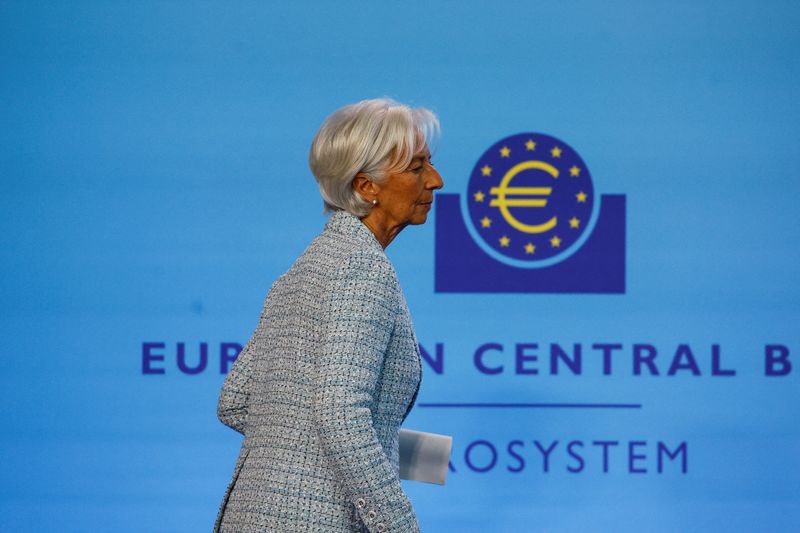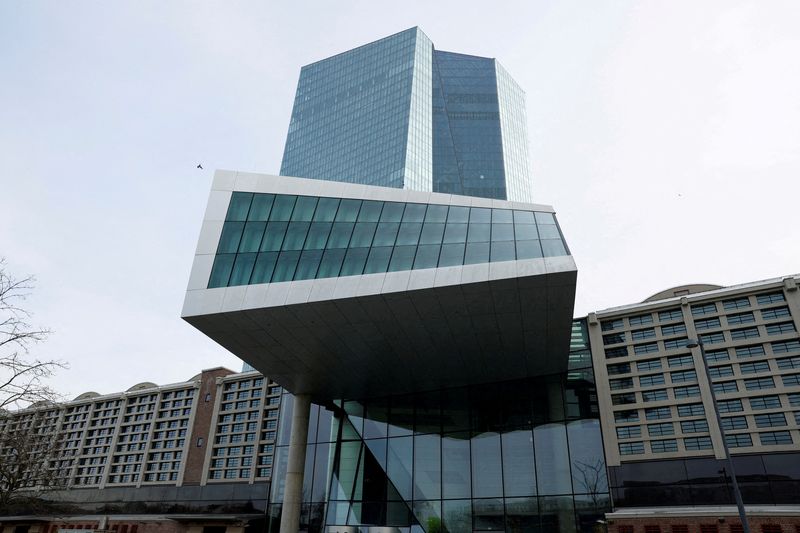(Reuters) - The European Central Bank cut rates for the first time in five years on Thursday, but kept investors in the dark about its next move, given increasing uncertainty over inflation after a sharp slowdown in the past year.
It lowered its record-high deposit rate by 25 basis points to 3.75%, but raised its inflation forecast for this year and the next.
The ECB stressed any further rate reduction would depend on incoming data and reaffirmed that borrowing costs needed to remain high enough to keep a lid on prices.
MARKET REACTION:
The euro rose to $1.0891 from $1.0866 just before the ECB rate decision and was last up 0.17% on the day.
Euro zone bond yields rose, with Germany's benchmark 10-year Bund yield last up 6.6 basis points at 2.56%, versus 2.53% earlier. Europe's broad stock index pared gains and was last up 0.4% on the day.
Money markets price in another 35 bps of ECB easing by the end of the year.
COMMENTS:
CHARLES SEVILLE, SENIOR DIRECTOR, FITCH RATINGS ECONOMICS TEAM, LONDON
"Forward guidance and data dependence were pointing in different directions ahead of this meeting, which is how the ECB ended up simultaneously cutting rates and (slightly) raising inflation forecasts compared with its March projections. Having said that, there has been progress in lowering inflation over the past year."
"The data may not support a rapid rate-cutting cycle, but in our view, there is still room to cut rates while keeping them at restrictive levels. "
ENRICO VACCARI, HEAD OF INSTITUTIONAL SALES, CONSULTINVEST, MILAN
"It's a very strange cut because, in fact, the ECB, which has always had a target of 2% inflation, has even raised the expected inflation estimates for 2024 to 2.5%. So, from the point of view of market rules... there was no reason to cut."
"In reality, it could also be an isolated rate cut. Today the ECB has waved goodbye to the 2% inflation target, implicitly establishing that this goal is no longer achievable in the short term."
SAMUEL ZIEF, HEAD OF GLOBAL FX STRATEGY, J.P. MORGAN PRIVATE BANK, LONDON
"Two things to note: first, they aren’t ‘pre-committing to a particular rate path’ and second, core inflation isn’t expected to reach 2% until later in 2025. All told, this was a cautious cut that leaves our baseline expectation for further cuts to occur at each meeting with updated projections intact."
"We currently think that September could be next. But no reason to expect significant reductions any time soon with growth actually picking up steam of late."
"Lower ECB rates certainly help, but the improving growth backdrop we’ve been highlighting over the past several months is what really fuels our optimism for investing in the region.
Incoming PMI data is consistent with a near-term annualised growth rate of 1.25%, up from 0.5% growth in Q1. The ECB upgraded its own growth projections today as well. We see an environment that should boost not only equities, but help limit any downside for the currency as well. Our fair value model for euro/dollar based on the euro versus the dollar growth revisions now puts fair value for the currency pair around 1.10."
SAMY CHAAR, CHIEF ECONOMIST, LOMBARD ODIER, GENEVA
"The excitement is to come. The only thing we can say is that they basically have the same 2026 inflation forecast as in March. As they don’t see inflation getting back to target until then, this means the ECB probably has 18 months to get back to a neutral rate."
"When they try to communicate about inflation forecasts this is what the game is about. They have initiated a cut, they will go slowly towards neutral, we don’t know where that is, so we will learn by doing. They will cut and see how the economy reacts, and do that again."
"Where I remain a little bit on high alert is usually communication and action don’t go the same way. If you make a dovish action, you have hawkish communication. Considering they’ve cut, very likely (ECB chief Christine) Lagarde will want to point out 'this is not the start of a cycle', 'we are not on auto pilot', and so on."
ARNE PETIMEZAS, SENIOR ANALYST, AFS GROUP, AMSTERDAM:
"The ECB surprised no one by cutting rates by 25 bps since the move was well-telegraphed in advance. While the ECB clearly opened the door to further rate cuts, they guide that policy will have to remain restrictive."
"Staff inflation forecasts increased, and the Governing Council sees little, or no further, improvement in underlying inflation this year. That suggests there’s room for two or three rate cuts in the next twelve months or so, with at least one move made next September, when the ECB narrows the interest rate corridor. Unless the U.S. enters a recession and the Fed cuts aggressively, the market has still somewhat overpriced ECB cuts in the next twelve months."
HETAL MEHTA, HEAD OF ECONOMIC RESEARCH, ST JAMES'S PLACE, LONDON:
"The ECB was pipped to the post by one day (by the Bank of Canada) to be the first G7 economy to cut interest rates in this economic cycle."
"So far, the euro area economy has been fairly ‘text book’ with inflation shock, rates up, inflation and growth down, so allowing for a fairly straight forward cut in rates.
But the labour market is tight and there is no urgency to cut rates back-to-back after this. Moreover, with the Fed and BoE at least a few months away the ECB will be mindful of foreign exchange effects."
MARK WALL, CHIEF EUROPEAN ECONOMIST, DEUTSCHE BANK, LONDON:
"As expected, the ECB cut rates 25bp. But the statement arguably gave less guidance than might have been expected on what comes next. In that sense, the immediate tone is a "hawkish cut”. This is not a central bank in a rush to ease policy."
LINDSAY JAMES, INVESTMENT STRATEGIST, QUILTER INVESTORS, LONDON:
"This is a significant move given it is the first rate cut from the ECB in five years, and ends what has been one of the most aggressive and swift rate hiking cycles in modern times."
"Importantly, this is not likely to be a single cut and done for a while, with signals suggesting a further cut or two are on the horizon this year as inflation has subsided."
"While inflation has ticked up in recent months, the economic recovery is beginning to play out. This puts the ECB in a good position to cut further into a slowly improving picture, although the messaging is likely to remain restrained and cautious. As such, there may be some pauses on the way back down for rates in order to limit the scope of any divergence with the Federal Reserve."
MARCHEL ALEXANDROVICH, EUROPEAN ECONOMIST, SALTMARSH ECONOMICS, LONDON:
"The ECB moved and followed through on its guidance. They are not committing to further rate cuts and a July move is off the table."
"The focus for markets is whether they will find room to cut in September."
"The ECB revised up their inflation forecasts and I am not surprised. Inflation is proving sticky and that makes it difficult for the ECB to be confident that inflation will come down to target."
"The key comment is that they are not committing to a pre-determined rate path."
DEAN TURNER, CHIEF EURO ZONE AND UK ECONOMIST, UBS GLOBAL WEALTH MANAGEMENT, LONDON:
"Today’s widely expected interest rate cut from the ECB will come as a welcome relief to the euro zone economy. The outlook for inflation, as indicated by the ECB’s latest projections, point to further interest rate reductions later this year."

"Of course, the timing of the next move from the ECB is uncertain, as this will be dependent upon incoming data. But with the disinflationary process firmly underway, the ECB, along with other central banks, should feel confident enough to ease policy, most likely at a pace of one cut per quarter. Moreover, we should expect this rate-cutting cycle to continue into 2025."
(This story has been corrected to fix inflation target figure to 2%, from 2.5%, in paragraph 14)
